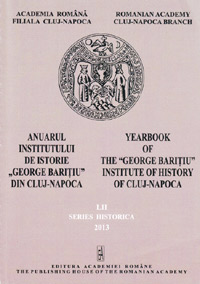Die Gemeindegesetzgebung in Siebenbürgen und ihre Regelung während des Neoabsolutismus und Liberalismus
The Issue of Communal Legislation in Transylvania during Neoabsolutism and Liberalism
Author(s): Lóránd L. MádlySubject(s): History
Published by: Editura Academiei Române
Keywords: Transylvania; communal laws; Neoabsolutism; Liberalism; Reformism
Summary/Abstract: The issue of the implementation of municipal laws in the Kronland of Transylvania was sawn as one of the most important responsibilities by the Habsburg authorities in their reformistic plans; the importance of this fields resided in the deep social, political and economical implication of regulating the function of the smallest administrative entities. The specific legislation in this domain was strongly connected both with the political framework and with the detailed administrative arrangement of the province; the existing various local conditions in each of these hindered the application of a uniform and equal administrative and municipal regulatory system for the whole empire. After a long time, characterised by the leading principle of the three dominant nations, the Neoabsolutist decade proved itself as an optimal opportunity for creating a new framework, based on the principles of the time, which could implement a uniform administrative rule. However, the implementation of new municipal laws remained behind the more important reforms of this time and was managed through temporary decrees with local applicability. The end of the Bach regime, and due to the proclamation of new fundamental state principles, the Liberal age brought these issues in the foreground, this time under new circumstances, characterized by the dispute between the national movements of the province over the necessary reforms. Now, the austro-hungarian dispute became most important issue in the political development of the Monarchy and shaped all the developments of the state. Under these circumstances, the problem of the municipal regulations, along with other more or less important reforms, was constantly postponed, and the Liberal period, with all the hopes attached to it, proved to be only a provisional arrangement leading to the austro-hungarian dualism.
Journal: Anuarul Institutului de Istorie »George Bariţiu« - Series HISTORICA
- Issue Year: LII/2013
- Issue No: 52
- Page Range: 203-211
- Page Count: 9
- Language: German

